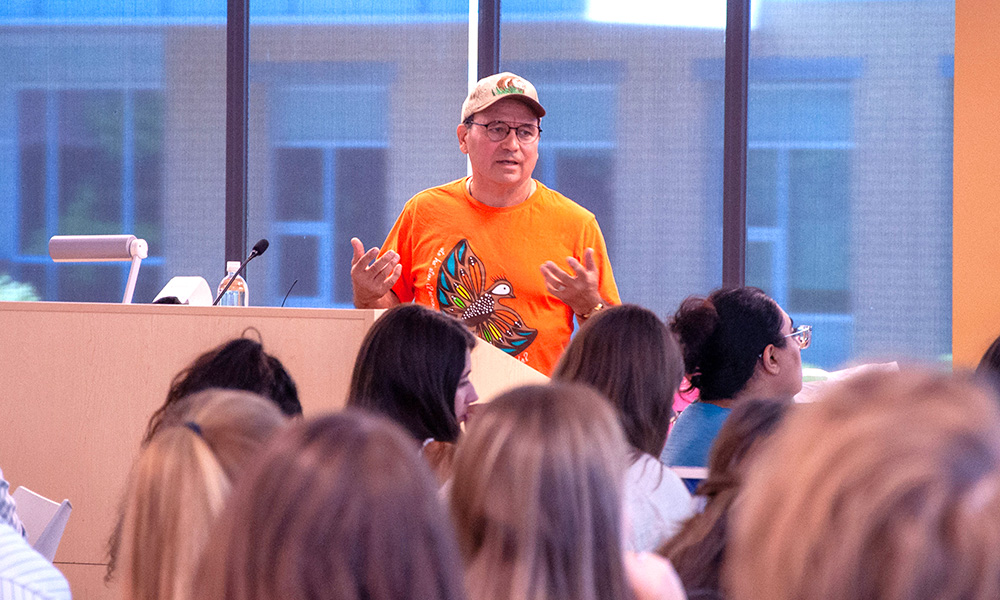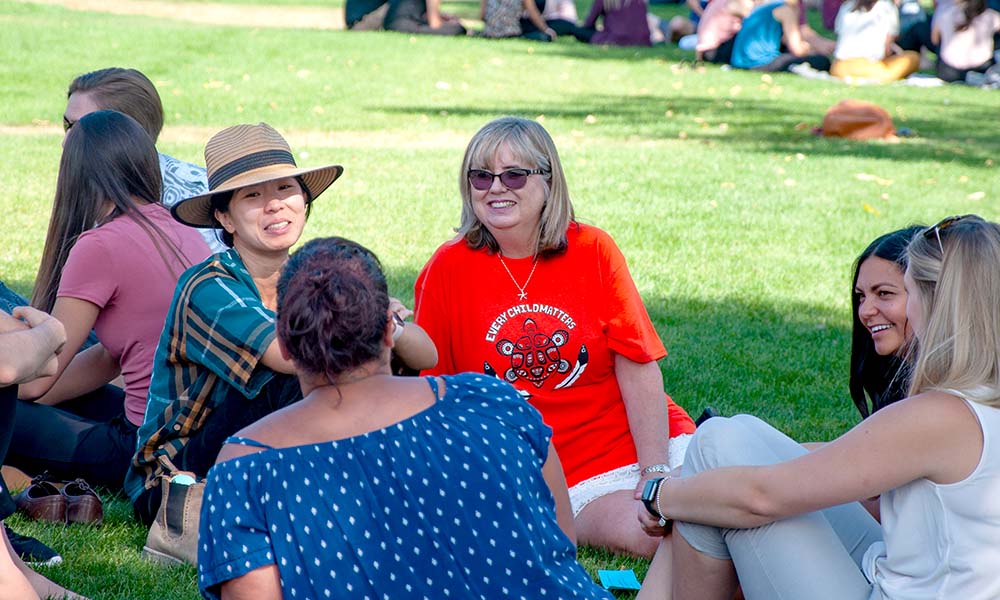Laughter rings through the University Centre Ballroom as a group of Bachelor of Education students present their puppet plays of a Syilx captikʷɬ story with tmixʷ puppets. The stories activate students’ collective imagination while growing their understanding of the cultural knowledge of the Syilx Okanagan people.
“Storytelling is a community practice,” says Dr. Bill Cohen, an Assistant Professor in the Okanagan School of Education and Indigenous Scholar. Dr. Cohen is from the Okanagan Nation, with extensive kinship ties throughout British Columbia and Washington.
“The puppet show is one way for the students to be the story. They create their own characters—and they can be as minimalistic or elaborate as they’d like—but it’s a collective and creative process.”
captikʷɬ – As defined by Dr. Cohen, captikʷɬ is the Syilx Okanagan traditional story system which expresses cumulative knowledge; literally, “the burning ember passed on generationally to ignite new understanding continuously.”
tmixʷ – As defined by Dr. Cohen, tmixʷ refers to all the diverse water, earth, plant and animal communities’ life strands with spirit and purpose.
The puppet show is one of many different activities and experiences where students learn and unlearn together. Much of Dr. Cohen’s teaching practice has been informed by capti̓kʷɬ, grounded in his Syilx homeland.
Take, for example, the graduate course that Dr. Cohen developed called Coyote Stories: Pedagogy and Praxis. The course focuses on Indigenous traditional knowledge stories and storytelling practices as they relate to theoretical frameworks within teaching and learning.
“We look at stories from Indigenous peoples locally and across the world, and we can see there are consistent themes,” says Dr. Cohen. “They express the interconnectedness and kinship of all beings and the shared responsibilities we have towards future generations.”
He adds: “Interior Salish stories address the presence of ‘monsters,’ which represent societal practices and systems like patriarchy and colonialism. These are destructive and homogenizing to cultural and eco-biodiversity, to food and wellness security. We also have Snk’lip (Coyote), who can transform monsters and make the world safe for the peoples to be. Snkl’lip’s gift, through storyways, is extended to us humans.
“We can use these narratives as a means of fostering understanding, healing and betterment of society.”
“I quickly realized I was learning a lot more from the Elders than they were from me, and that multiple knowledge streams are the way to go.”
Reflecting on his own primary and secondary education, Dr. Cohen says those years were marked by systemic biases and racism in the education system and subsequent disengagement, but he fondly remembers one inspiring teacher.
“Mrs. Young, my 12th-grade English teacher, was the first to say something positive about my writing, and was very encouraging, which helped plant the seeds for a pathway into education.”
This path continued at the Nicola Valley Institute of Technology, where Dr. Cohen volunteered as a literacy tutor.
“I was teaching and working with mostly Elders and adults who were well educated in the Interior Salish sense,” explains Dr. Cohen. “They knew our languages and traditional knowledge, but didn’t read or write English well. I quickly realized I was learning a lot more from them than they were from me, and that multiple knowledge streams are the way to go. With encouragement from Elders and family members, I decided to get some credentials.

Dr. Bill Cohen in the classroom.
“When I began teaching subjects like English, social studies and math, I noticed a lack of kinship pedagogy from Syilx Okanagan storyways and practices, where teachers are in aunty-uncle roles with kinship responsibilities to students.”
Now, after nearly 40 years of teaching, he sees his educator role as being a connector. That is, bringing together Elders and traditional knowledge with students and teachers, and co-creating new curriculum.
A passion for his community is at the heart of many of Dr. Cohen’s endeavours. Over the last several decades, he has played a leadership role in a number of initiatives and projects designed to enhance community, including bush school projects with En’owkin Centre, and the creation of an Okanagan Indian Band Cultural Immersion Elementary School.
In recognition of his dedication and passion for inspiring the next generation of educators, Dr. Cohen was recognized by UBC Okanagan with the 2024 Provost’s Award for Teaching Excellence and Innovation.
“With capti̓kʷɬ pedagogy with students and educators, collectively we can transform schools to be more appreciative and sustaining with place-based relationships and cultural and ecological diversity.”
The post How Dr. Bill Cohen is transforming education through Indigenous perspectives appeared first on UBC Okanagan News.

